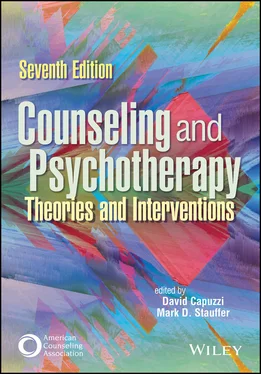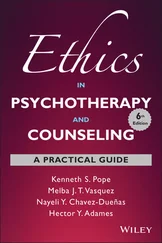Counseling and Psychotherapy
Здесь есть возможность читать онлайн «Counseling and Psychotherapy» — ознакомительный отрывок электронной книги совершенно бесплатно, а после прочтения отрывка купить полную версию. В некоторых случаях можно слушать аудио, скачать через торрент в формате fb2 и присутствует краткое содержание. Жанр: unrecognised, на английском языке. Описание произведения, (предисловие) а так же отзывы посетителей доступны на портале библиотеки ЛибКат.
- Название:Counseling and Psychotherapy
- Автор:
- Жанр:
- Год:неизвестен
- ISBN:нет данных
- Рейтинг книги:4 / 5. Голосов: 1
-
Избранное:Добавить в избранное
- Отзывы:
-
Ваша оценка:
- 80
- 1
- 2
- 3
- 4
- 5
Counseling and Psychotherapy: краткое содержание, описание и аннотация
Предлагаем к чтению аннотацию, описание, краткое содержание или предисловие (зависит от того, что написал сам автор книги «Counseling and Psychotherapy»). Если вы не нашли необходимую информацию о книге — напишите в комментариях, мы постараемся отыскать её.
Counseling and Psychotherapy — читать онлайн ознакомительный отрывок
Ниже представлен текст книги, разбитый по страницам. Система сохранения места последней прочитанной страницы, позволяет с удобством читать онлайн бесплатно книгу «Counseling and Psychotherapy», без необходимости каждый раз заново искать на чём Вы остановились. Поставьте закладку, и сможете в любой момент перейти на страницу, на которой закончили чтение.
Интервал:
Закладка:
Sidebar 1.3 Supervision Responsibility and the Counselor Educator
The idea that graduate students must already be able to provide clients with core conditions in a helping relationship for supervision, instruction, and mentoring to enhance or expand this ability raises some interesting questions about the role of the counselor educator in the process of working with a graduate student enrolled in a counselor education program. Is the role of the counselor educator to help raise awareness on the part of a beginning counselor with respect to inherent traits and ways of relating to others that automatically contribute to the provision of therapeutic core conditions that can be enhanced and strengthened, or is it possible for the counselor educator to help a student develop such traits if they are not already present? What is the responsibility of the counselor educator if a student who wants to be a licensed professional counselor cannot seem to provide the core conditions needed to establish a safe working alliance with clients?
The ability to provide clients with core conditions in the context of a helping relationship must already be present to some degree in the personhood of graduate students for supervision, instruction, and mentoring to enhance or expand the ability to cocreate core conditions. Building from this base, counselors must study, train, and be committed despite long hours and inevitable discomfort of personal growth that allows them to create conditions mutually with clients that will affirm, support, and empower. The concept of basic or core conditions suggests that, when present, they enhance the effectiveness of the helping relationship at various stages. The terminology for these conditions varies from author to author but generally includes the following: empathic understanding, respect and positive regard, genuineness and congruence, concreteness, warmth, and immediacy (see Sidebar 1.4).
The remainder of this section deals with the core conditions and relates these directly to personal characteristics or behaviors of counselors or therapists that should enhance their ability to effectively use these conditions in the process of helping. Although definitions, emphases, and applications of these conditions differ across theoretical systems, there seems to be agreement about their effectiveness in facilitating change in the overall helping relationships (Brammer et al., 1993; Brems, 2000; Clark, 2010; Freedberg, 2007; Gatongi, 2008; Gladding, 2018; Prochaska & Norcross, 2013).
Empathic Understanding
Empathic understanding is the ability to feel with clients as opposed to feeling for clients. It is the ability to understand feelings, thoughts, ideas, and experiences by viewing them from the client’s frame of reference. The counselor or therapist must be able to enter the client’s world, understand the myriad aspects that make up that world, and communicate this understanding so that the client perceives that they have been heard accurately (Coutinho et al., 2014; Freedberg, 2007; Gatongi, 2008; Singer et al., 2009).
Sidebar 1.4 Personal Characteristics of the Counselor Candidate
In conjunction with each of the core conditions described in this chapter (empathic understanding, respect and positive regard, genuineness and congruence, concreteness, warmth, and immediacy), there is a list of personal characteristics the counselor should have. Do you think you are a person with such attributes? If not, do you view this as a dilemma, given your choice to become a counselor?
Egan (2013) identified both primary and advanced levels of empathic understanding. At the primary level, it involves the ability to understand, identify, and communicate feelings and meanings that are at the surface level of the client’s disclosures. At the advanced level, it involves the ability to understand, identify, and communicate feelings and meanings that are buried, hidden, or beyond the immediate reach of a client. Such feelings and meanings are more often covert than overt client expressions. Additionally, clients who are a part of marginalized groups may express feelings of being misunderstood. It is important for counselors to understand that they do not have to share similar experiences to practice this skill effectively. Counselors who remain committed to understanding their client’s experiences from the client’s vantage point can draw from aspects of cultural competence and cultural humility to increase their empathic understanding. For example, because trans and nonbinary clients often face lack of empathy in heteronormative-reinforced familial and social institutions, it is so important for the counselor to be empathic and affirming; however, there may be initial mistrust or hostility when a cisgendered counselor’s empathic attempts feel more like an attempt to communicate “I get it” as if part of the ingroup (dickey & Singh, 2020).
Personal characteristics or behaviors that enhance a counselor’s or therapist’s ability to provide empathic understanding include, but are not limited to, the following:
The knowledge and awareness of one’s own values, attitudes, and beliefs and the emotional and behavioral impact they have on oneself and others
The knowledge and awareness of one’s own feelings and emotional response patterns and how they manifest themselves in interactive patterns
The knowledge and awareness of one’s own lived experiences and one’s personal reactions to those experiences
The capacity and willingness to communicate these personal reactions to one’s clients
Respect and Positive Regard
Respect and positive regard are defined as the belief in each client’s innate worth and potential and the ability to communicate this belief in the helping relationship. This belief, once communicated, provides clients with positive reinforcement relative to their innate ability to take responsibility for their own growth, change, goal determination, decision-making, and eventual problem resolution. It is an empowering process that delivers a message to clients that they are able to take control of their lives and, with facilitative assistance from the counselor or therapist, foster change. Communicating and demonstrating this respect for clients takes many forms. According to Baruth and Robinson (1987), it “is often communicated by what the counselor does not do or say. In other words, by not offering to intervene for someone, one is communicating a belief in the individual’s ability to ‘do’ for himself or herself” (p. 85).
Personal characteristics or behaviors that enhance a counselor’s or therapist’s ability to provide respect and positive regard include, but are not limited to, the following:
The capacity to respect oneself
The capacity to view oneself as having worth and potential
The capacity to model and communicate this positive self-image to clients
The capacity to recognize one’s own control needs, and the ability to use this recognition in a manner that allows clients to direct their own lives
We think it is worth noting, however, that in no type of counseling is it possible for the counselor—a conditioned cultural product—to provide unconditional positive regard unless they are sensitive to the cultural norms of the client (Ibrahim & Dykeman, 2011).
Genuineness and Congruence
Genuineness and congruence are relational qualities that have received renewed interest (Klein et al., 2001). Genuineness and congruence describe the ability to be authentic in the helping relationship (Sue & Sue, 2013). The ability to be real as opposed to artificial, to behave as one feels as opposed to playing the role of the helper, and to be congruent in terms of actions and words are further descriptors of this core condition (Kolden et al., 2011). According to Schnellbacher and Leijssen (2009),
Читать дальшеИнтервал:
Закладка:
Похожие книги на «Counseling and Psychotherapy»
Представляем Вашему вниманию похожие книги на «Counseling and Psychotherapy» списком для выбора. Мы отобрали схожую по названию и смыслу литературу в надежде предоставить читателям больше вариантов отыскать новые, интересные, ещё непрочитанные произведения.
Обсуждение, отзывы о книге «Counseling and Psychotherapy» и просто собственные мнения читателей. Оставьте ваши комментарии, напишите, что Вы думаете о произведении, его смысле или главных героях. Укажите что конкретно понравилось, а что нет, и почему Вы так считаете.












